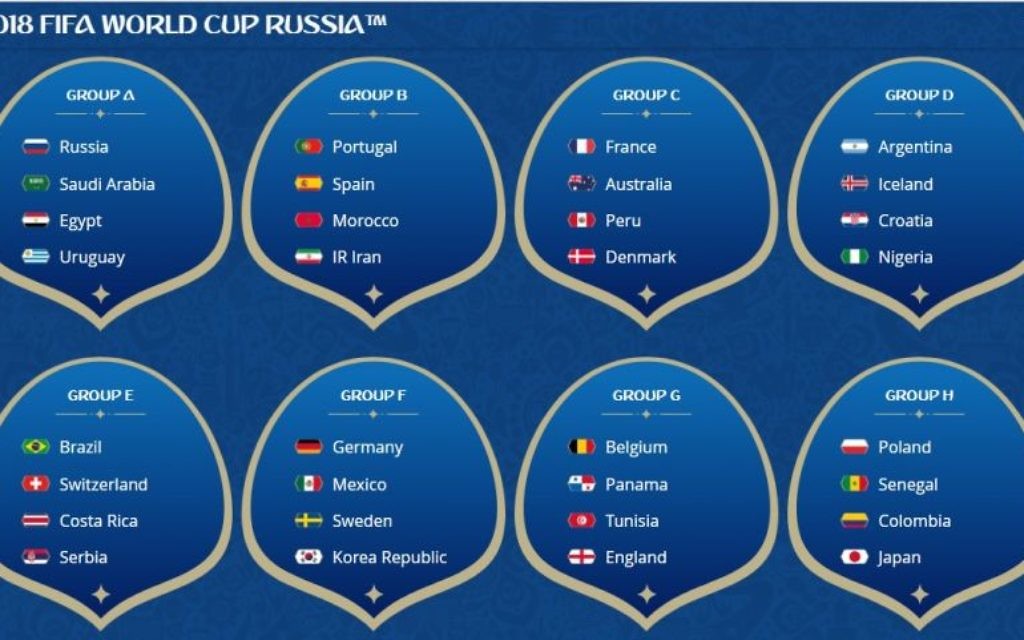The World Cup Is a Special Distraction
My mind will be in Russia and my eyes on the TV screen through July 15.

Please excuse me if I appear a bit distracted for the next month.
My attention will be on Russia and the men’s World Cup finals, the greatest spectacle that soccer, “the beautiful game,” has to offer.
The World Cup is the most watched sporting event in the world, with a potential viewing audience estimated at 500 million.
Get The AJT Newsletter by email and never miss our top stories Free Sign Up
From the first game June 14 to the championship July 15, emotions in the 32 competing nations will rise and fall on the outcome of the tournament’s 64 games.
Soccer is ingrained in the culture in much of the world, with loyalties passed down through the generations. In some countries, the national team can be a balm that eases, however briefly, issues of government strife, economic turmoil and ethnic divisions.
Having traveled to Germany in 2006, I can attest that, for soccer’s most devoted fans, attending the World Cup is akin to a pilgrimage. The camaraderie among fans of various nations is a tonic for what ails the world.
Supporters of the U.S. men’s team remain distressed over its ignominious failure to qualify for Russia, ending a streak of seven consecutive appearances in the World Cup finals that began in 1990.
(The defending and three-time world champion U.S. women’s team, meanwhile, is expected to qualify for its World Cup next year in France.)
The U.S. absence in Russia will, however, spare us hyperbolic tweets and soccer-ignorant punditry that would have accompanied an American presence and any potential matchup against the host country or Iran.
Israel’s absence from Russia is less surprising.
Israel has qualified for the World Cup finals just once, in 1970, when the then-16-team tournament was played in Mexico. Israel fell 2-0 to Uruguay, then drew 1-1 with Sweden and 0-0 with Italy and failed to advance out of the group stage.
In the years since, the blue-and-white have teased their fans with inconsistent performances in qualifying.
Soccer is hardly immune from Middle East politics; witness Israel’s recent “own goal” embarrassment over a canceled friendly match with World Cup-bound Argentina.
In recent years, Palestinian soccer officials have complained to FIFA — the international governing body of “football” — about lower-level professional teams operating out of West Bank settlements and have alleged that Israel interferes in the operation of the Palestinian national team.

FIFA, mind you, has spent recent years in the dock, literally, as the subject of criminal investigations and, figuratively, in the court of public opinion.
Going back in time, beginning in 1954, Israel played in Asian regional competitions. But in 1974, as Arab nations refused to play Israel, FIFA moved Israel out of Asia, eventually relocating it to Oceania — a collection of Pacific island nations. Israel moved into the European region in 1991.
In the first group stage of qualifying for this year’s World Cup, Israel finished fourth out of six teams — behind Spain and Italy (both of which advanced to a second round) and Albania, but ahead of Macedonia and Liechtenstein.
Interest in the World Cup is particularly strong this year in the Arab world, as Egypt, Tunisia, Morocco and Saudi Arabia all qualified.
Indeed, one of the marquee players in the run-up to the World Cup is Mohamed Salah of Egypt, who had a remarkable season in England’s top professional league.
Qatar, meanwhile, is preparing to host the 2022 World Cup, deflecting controversies about the bidding process by which it earned that right and its treatment of foreign construction workers.
It’s worth rooting for Israel to qualify in 2022, if only to see how FIFA would twist itself in knots, particularly if Israel were drawn to play against politically unfriendly nations.
For now, though, my attention is focused on Russia. I am hoping for exciting play on the field and an absence of locally inspired hooliganism and racism in the stands.
Even for someone who watches a lot of soccer, the World Cup is special. So please excuse me if I appear a bit distracted.




comments